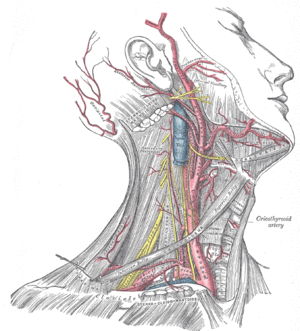Carotid Triangle: Difference between revisions
From WikiLectures
m (typo) |
m (typo) |
||
| Line 6: | Line 6: | ||
[[Image:Gray512.gif|thumb|right|Carotid triangle]] | [[Image:Gray512.gif|thumb|right|Carotid triangle]] | ||
== Boundary == | == Boundary == | ||
'''Carotid triangle''' is a space at the anterior portion of the neck. It is bounded by the [[sternocleidomastoid muscle]], by the superior belly of the [[omohyoid muscle]] and by the posterior belly of the [[digastric muscle]] with the [[ | '''Carotid triangle''' is a space at the anterior portion of the neck. It is bounded by the [[sternocleidomastoid muscle]], by the superior belly of the [[omohyoid muscle]] and by the posterior belly of the [[digastric muscle]] with the [[sternohyoid muscle]]. | ||
== Content == | == Content == | ||
Revision as of 12:51, 19 July 2011
| English: Carotid triangle Latin: Trigonum caroticum |
Boundary
Carotid triangle is a space at the anterior portion of the neck. It is bounded by the sternocleidomastoid muscle, by the superior belly of the omohyoid muscle and by the posterior belly of the digastric muscle with the sternohyoid muscle.
Content
This area contains common carotid artery with its branches, internal carotid artery and external carotid artery. External carotid artery then gives these branches:
- superior thyroid artery (arteria thyroidea superior);
- lingual artery (arteria lingualis);
- facial artery (arteria facialis);
- occipital artery (arteria occipitalis);
- ascending pharyngeal artery (arteria pharyngea ascendens).
In the carotid triangle we can see also the hypoglossal nerve, which crosses the bifurcated carotid arteries, and accessory nerve. Behind carotid arteries and internal jugular vein we can find the vagus nerve and much deeper the sympathetic trunk.






